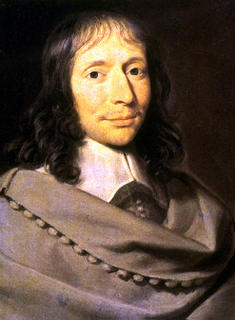 Blaise Pascal was born in Clement, France in 1623. From an early age, he was identified as a prodigy. When he was eleven, he wrote an essay on the sounds of vibrating bodies. His father did not take well to this and forbid him from studying mathematics. At 12, he came up with his own proof that the sum of the angles of a triangle add up to sum of two right angles. His was father was impressed with this and decided that it was ok if Pascal read Euclid's Elements. At the age of 16, Pascal wrote an essay on conic sections which included a result known today as Pascal's Theorem. At age 18, he created a mechanical calculator capable of addition and subtraction (he was the second person to do this; Wilhelm Schickard had built the first one in 1624).
Blaise Pascal was born in Clement, France in 1623. From an early age, he was identified as a prodigy. When he was eleven, he wrote an essay on the sounds of vibrating bodies. His father did not take well to this and forbid him from studying mathematics. At 12, he came up with his own proof that the sum of the angles of a triangle add up to sum of two right angles. His was father was impressed with this and decided that it was ok if Pascal read Euclid's Elements. At the age of 16, Pascal wrote an essay on conic sections which included a result known today as Pascal's Theorem. At age 18, he created a mechanical calculator capable of addition and subtraction (he was the second person to do this; Wilhelm Schickard had built the first one in 1624).Pascal's father, Etienne, was a local magistrate and was an acquaintance of many of the most famous intellectuals of his day including Rene Descartes, Pierre Gassendi, and Girard Desargues. It is said that when Descartes saw Pascal's writing on conic sections, he refused to believe that the boy had written it. Pascal's mother died when he was three years old so he was raised and educated by his father.
In 1653, Pascal wrote his famous treatise on what is today known as Pascal's Triangle. This is a method for determining the binomial coefficients for a given value of (a + b)n. Interestingly, Pascal was not the first to come up with this method. It had been discovered 400 years earlier by the Chinese mathematician Yang Hui.
In 1654, Pascal became interested in figuring out the odds associated with gambling. He wrote some letters to Pierre de Fermat seeking his opinion and their correspondences became the foundation for Probability Theory.
Pascal made numerous contributions to science. He studied the effects of air pressure on fluids and correctly proposed that a vacuum explained the the dynamics of mercury in a barometer (at the time, it was not clear how mercury-based barometers worked). His experiments with barometers attracted attention across Europe. At the time, Descartes argued that a vacuum could not exist.
In 1654, Pascal's carriage almost fell off a bridge. He was crossing the bridge when his horses lost their step and went over. The carriage would have followed but the reins broke and the carriage balanced over the edge of the bridge. Pascal and his passenger managed to get back to the bridge but fifteen days later, Pascal had a religious experience. After this, he began writing works of a philosophical and religious nature. His Provincial Letters and Pensees became very famous. The Pensees was released after his death.
In 1659, Pascal grew seriously ill; through out his life, his health had been bad but this time, he did not recover. In 1662, when he was 39, he died.
Today Pascal stands as one of the giants of his age. The pascal is the SI unit of pressure and his literary works are considered among the greatest of his time. He is seen as one of the fathers of the computer and his work with Fermat on probability theory is at the foundation of economics and the social sciences.
References
- Blaise Pascal, Wikipedia
- Blaise Pascal, MacTutor
